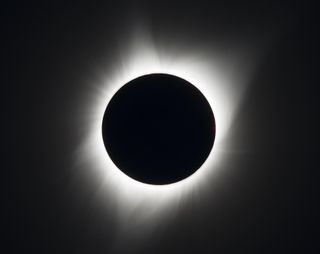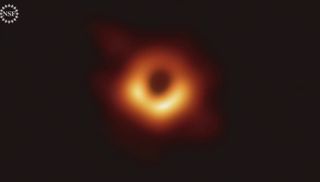This week in our Space.com forums: SpaceX prizes, first eclipses, and black holes!

The Space.com forums continue to grow, with fellow space aficionados sharing (and contesting) ideas. In fact, we recently hit the 8,000 member mark, celebrating the growth of this friendly community! What's more, the chatter continues with people discussing eclipses and black holes this week
However, before all that, we start with our latest giveaway!
SpaceX prizes

Let us know what you think of SpaceX, science fiction and more in our Space.com Forums here!
Continuing our partnership with The Space Store, this month's giveaway centers around SpaceX. We've got two excellent prizes for one winner who will have to answer a specific question: If Elon Musk put you in charge of SpaceX today ... what's the first thing you would do?
Head over to this thread for more details on how to enter — and the prizes you could win! You've got until 11:59 PM ET on May 7th, 2021.
Your first eclipse
We asked the community to let us know about the first time they remember seeing an eclipse:
I believe it was 1972 and I was in 6th grade. Our school only had two viewing glasses so everybody could only look for a couple of seconds. By the time the glasses got to the last kids, the eclipse had ended. - Brewmasterbill
My very first memory was before I even started school. I wandered off from.the farmhouse into the wheat field. I was enjoying the golden color and laid down onto the wheat grass.. As I lie there looking up the sky went total black and I saw the stars. I could hear my mother hollering for me. So headed toward her voice. I got a scolding For leaving the yard and then another one for looking directly at the moon and sun. This was back in the late 1950s in the state of Kentucky. I was 3 years old.. I do not know why this memory is so vivid today. But I know over the years I always cherished it as a wonderful moment in my young life. - hamsterbytes
Get the Space.com Newsletter
Breaking space news, the latest updates on rocket launches, skywatching events and more!
Well I have a strange incident that happen to me and my brother while fishing off the coast of Trinidad. I remember its was the 90s and the solar eclipse was about mid day and no fish was biting and all of sudden as soon the eclipse started we started to catch good size red fish and if we have two hooks on the line we would catch two one time and as soon eclipse done they stop biting this is something I will always remember because it was so strange that happen during the eclipse. - Ricardo Vincente
Check out the rest of the thread here.
Black holes are tricky

It will come as no surprise to any space enthusiast that black holes continue to amaze and surprise us all. From the most qualified scientist to the average hobbyist or student, this class of phenomena always alludes complete understanding. One community member proved that further by asking a fascinating question: can a black hole take on the process of fusion? If so, could a photon find its way into said black hole?
Here's just a taste of the ensuing conversation:
I just have to go with what the cosmologists, astronomers, and physicists have said, and of course they are lot smarter than I am. That is that black holes are created as the result of the implosion of a star that was so powerful that it has left a tear or "hole" in the fabric of spacetime. The gravitational pull of a black hole is so strong that not even light can go past its event horizon. So my answer is "no" a photon could not enter a black hole, because a photon is just a little packet of light. - Logicalgal175
A photon can travel past the event horizon, but only one way. It can go in, but it cannot escape. The gravitational pull of the black hole is so powerful that anything inside the event horizon would have to be able to travel faster than the speed of light in order to escape. In fact, that is a rough definition of what the event horizon is. It isn't a tangible thing that must be penetrated, it's a point of no return determined by the mass and density of the black hole. - VVet1968
Read more of this intriguing chat here.
Trending threads
A paradox of positions in space.
Follow us on Twitter @Spacedotcom or Facebook.
Join our Space Forums to keep talking space on the latest missions, night sky and more! And if you have a news tip, correction or comment, let us know at: community@space.com.
